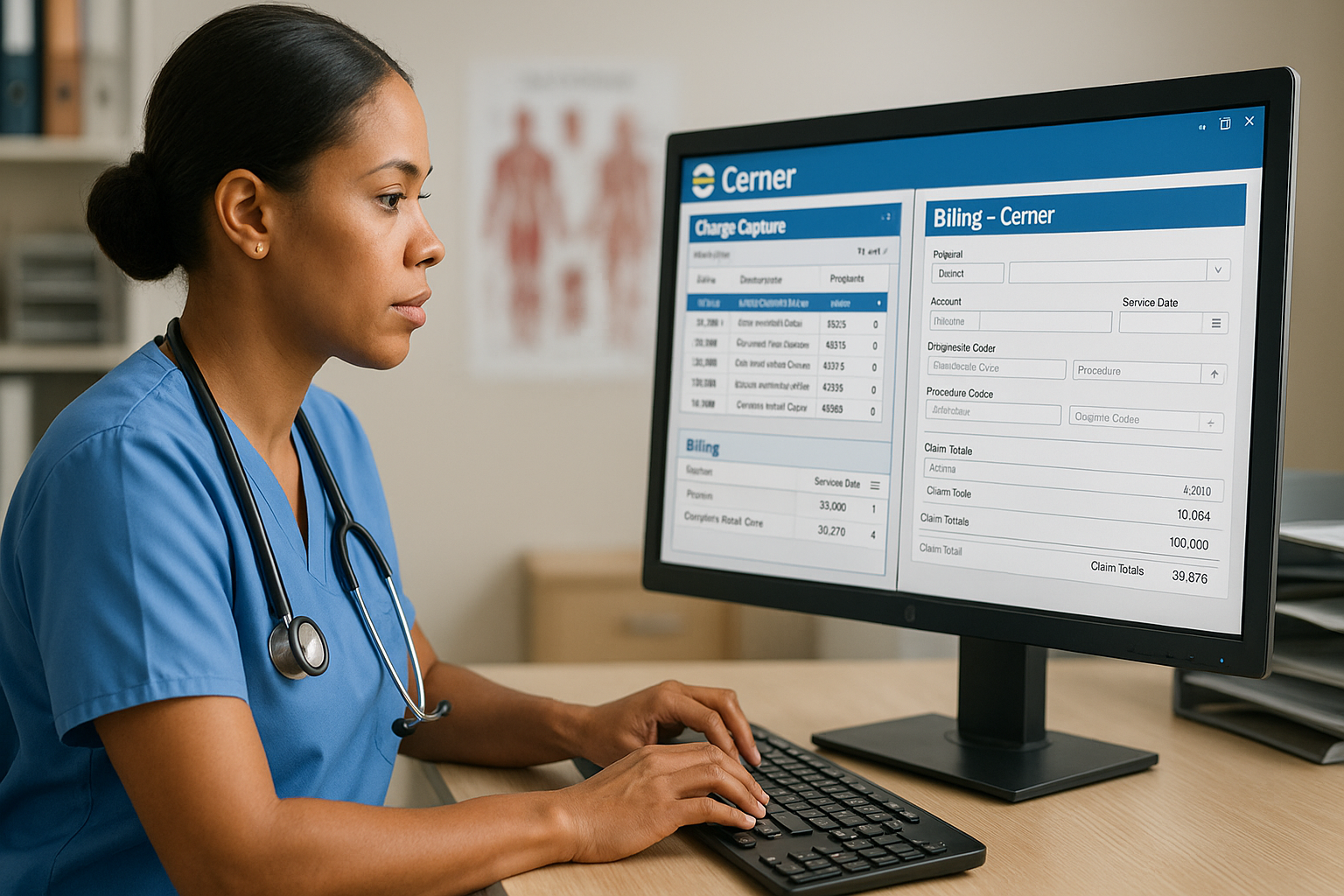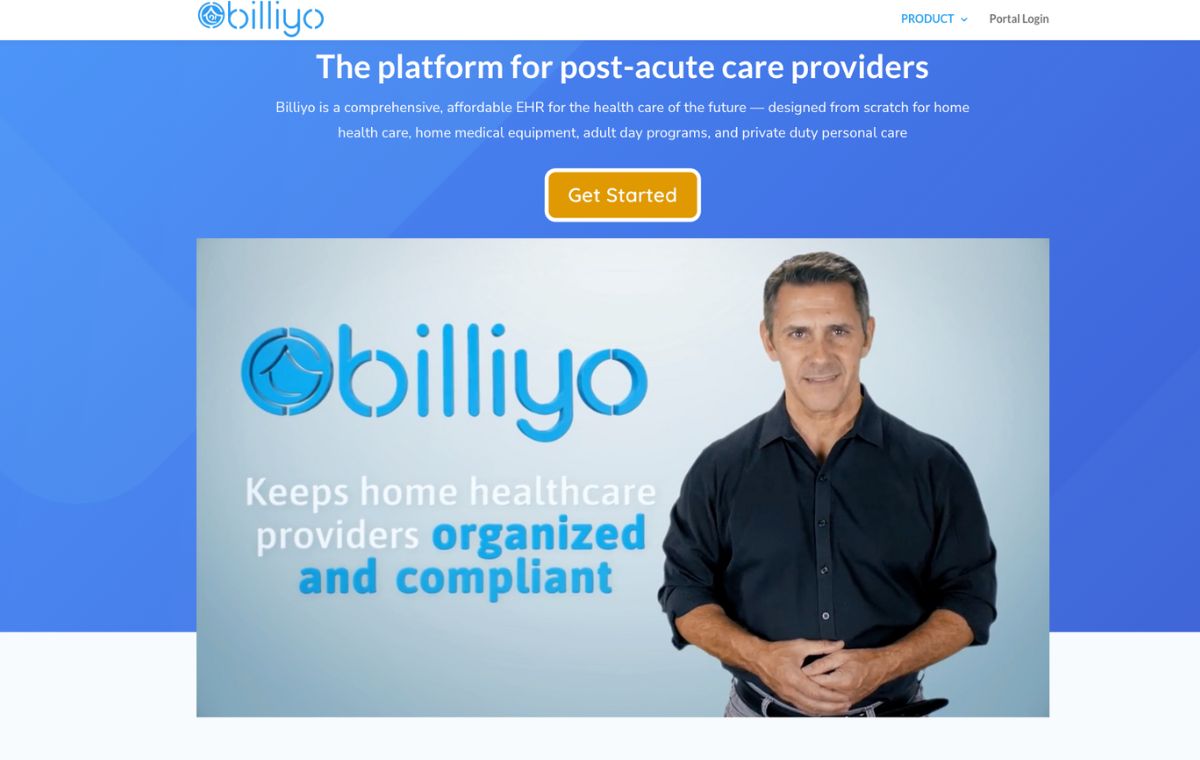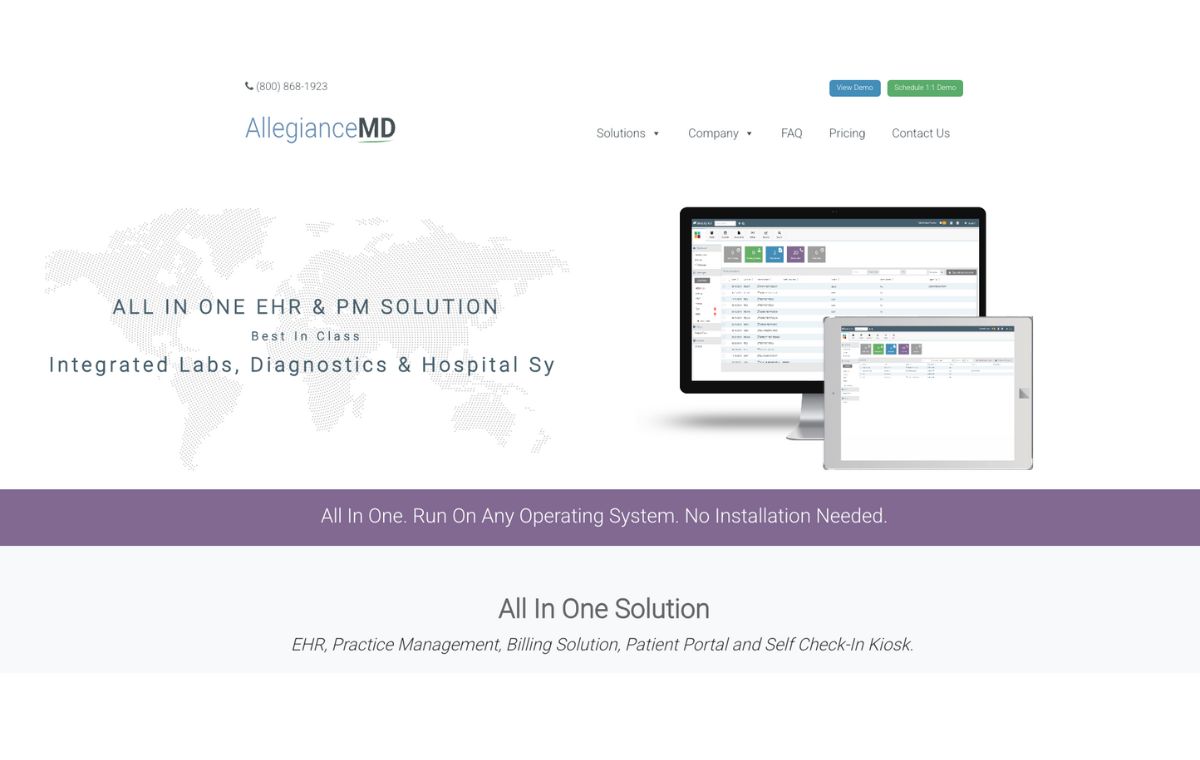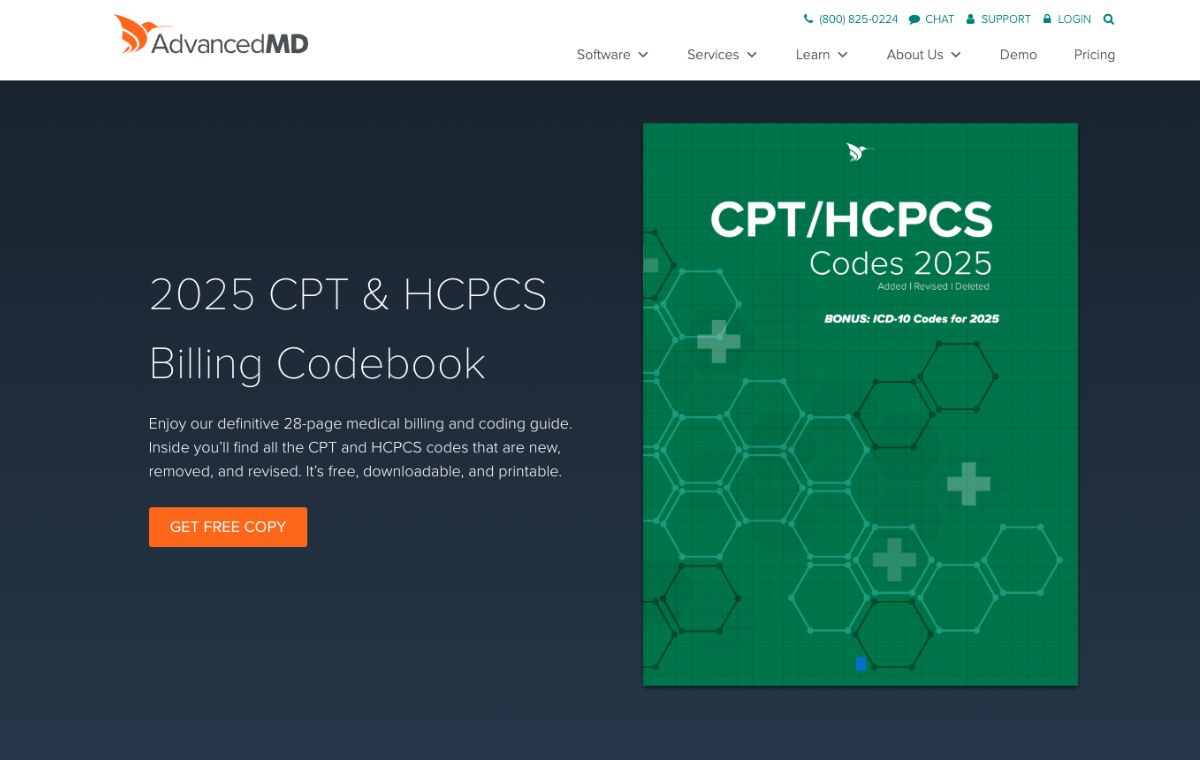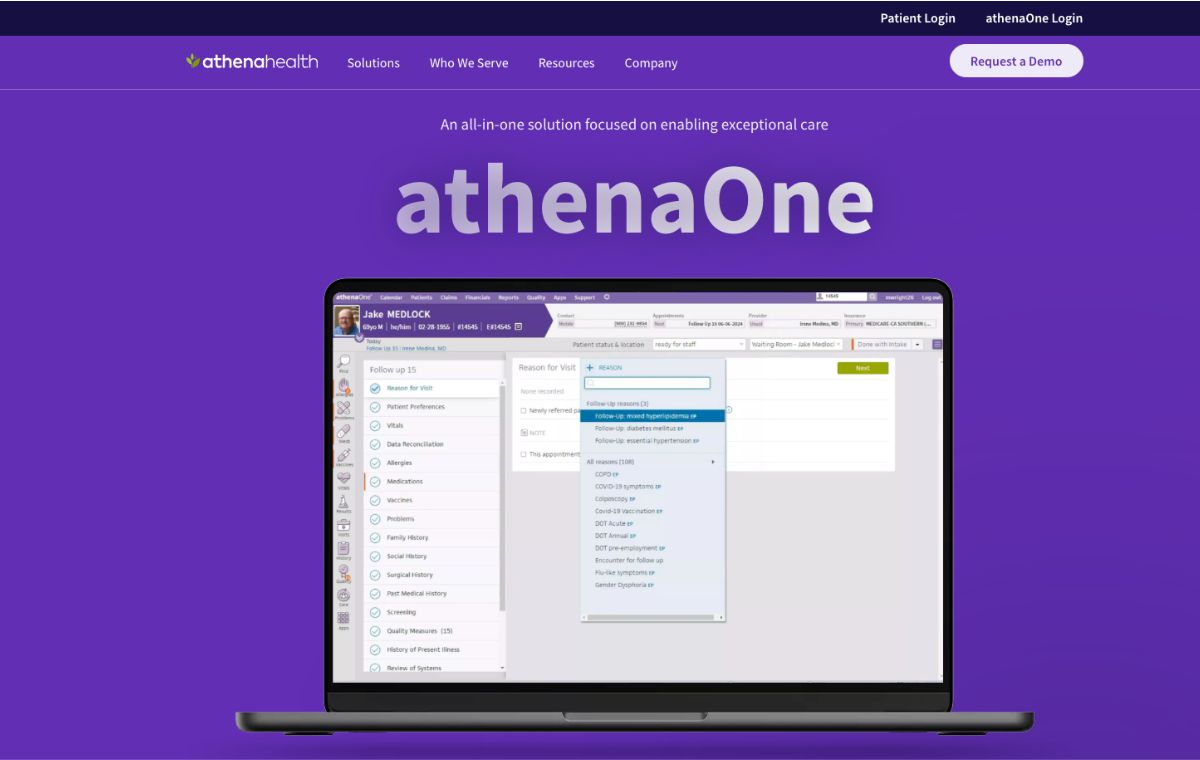A Cerner Charge Capture & Billing Specialist is a healthcare professional who manages how medical services get billed using Cerner’s computer systems. They make sure all treatments and procedures are correctly recorded so hospitals and doctors get paid properly. These specialists need to know both medical coding and how to use Cerner’s special software that tracks charges and creates insurance claims.
What Does a Cerner Charge Capture & Billing Specialist Do?
Core Responsibilities
Cerner Charge Capture & Billing Specialists work at the intersection of healthcare and finance. Their main job is to ensure that healthcare organizations are properly compensated for the services they provide. Here’s what they do on a daily basis:
- Enter and verify charges for medical services in the Cerner system
- Review patient accounts to ensure all billable services are captured
- Create and submit insurance claims using Cerner’s revenue cycle modules
- Fix rejected claims by correcting errors and resubmitting them
- Work with clinical staff to make sure documentation supports the charges
- Keep up with changes in medical billing rules and insurance requirements
- Run reports to track revenue and identify billing issues
The Importance of Accurate Charge Capture
Getting charges right is super important for hospitals and clinics. When charges are missed or entered incorrectly, healthcare organizations lose money. In fact, studies show that hospitals can lose between 1% and 5% of their revenue due to charge capture errors. For a medium-sized hospital, this could mean millions of dollars each year!
Cerner Billing Specialists help prevent these losses by making sure:
- Every service provided is properly recorded
- Charges match the actual services delivered
- Documentation supports the billing codes used
- Claims meet insurance requirements the first time
Cerner Revenue Cycle Management Tools
Key Modules Used by Billing Specialists
Cerner offers several software modules specifically designed for charge capture and billing. Specialists need to be familiar with these tools:
1. PathNet
This module is used for laboratory charge capture. It tracks lab tests and automatically creates the appropriate charges based on ordered procedures.
2. PharmNet
PharmNet handles medication charges and pharmacy workflows. It ensures all medications dispensed are properly billed.
3. SurgiNet
This specialty module captures charges for surgical procedures and supplies used in operating rooms.
4. PowerChart
The main electronic health record (EHR) module where clinical documentation happens. Billing specialists often need to review notes here to verify charges.
5. Patient Accounting
The central billing module where charges are compiled, claims are generated, and payment posting occurs.
The Charge Navigator Interface
One of the most important tools for Cerner Charge Capture Specialists is the Charge Navigator interface. This dashboard shows:
- Pending charges that need review
- Charges ready for submission
- Rejected claims requiring attention
- Revenue trends and patterns
Learning to navigate this interface efficiently is a key skill for anyone in this role.
Essential Skills for Success
Technical Competencies
To excel as a Cerner Charge Capture & Billing Specialist, you need a mix of healthcare knowledge and technical abilities:
- Cerner Software Proficiency: Hands-on experience with Cerner’s revenue cycle modules is essential. This includes understanding system workflows, shortcuts, and troubleshooting common issues.
- Medical Coding Knowledge: Familiarity with ICD-10, CPT, and HCPCS coding systems allows specialists to verify that the right codes are being used for billing.
- Insurance Billing Expertise: Understanding how different insurance plans work, including Medicare, Medicaid, and commercial payers, helps in creating clean claims.
- Data Analysis Skills: The ability to run and interpret reports helps identify missing charges and revenue opportunities.
Soft Skills That Matter
Beyond technical know-how, successful billing specialists also need:
- Attention to Detail: Small errors can cause big problems in medical billing. Being detail-oriented helps catch mistakes before they impact revenue.
- Communication Skills: Billing specialists often need to explain complicated billing issues to clinical staff who may not understand financial processes.
- Problem-Solving Ability: When claims are rejected, specialists need to figure out why and determine the best way to fix the issue.
- Time Management: With many accounts to monitor and deadlines for claim submission, organizing work efficiently is crucial.
Career Path and Growth Opportunities
Starting as a Cerner Billing Specialist
Many people enter this field with:
- An associate degree in health information management or medical billing
- Basic certification in medical coding or billing
- Entry-level experience in healthcare administration
- On-the-job training with Cerner systems
Beginning specialists typically focus on routine charge entry and basic claim processing before moving to more complex responsibilities.
Advanced Career Options
With experience, Cerner Charge Capture & Billing Specialists can advance to:
- Team Lead or Supervisor: Overseeing the work of other billing specialists and helping train new team members.
- Revenue Cycle Analyst: Using data to identify trends and opportunities to improve the billing process.
- Cerner Application Specialist: Becoming an expert who helps configure and optimize the Cerner system.
- Revenue Cycle Manager: Taking broader responsibility for the entire billing operation.
Some specialists also choose to specialize in particular areas like:
- Inpatient vs. outpatient billing
- Specific service lines (cardiology, oncology, etc.)
- Denial management and appeals
- Compliance and auditing
Common Challenges and How to Overcome Them
Challenge #1: Keeping Up with Changing Rules
Healthcare billing rules change constantly. Insurance companies update their requirements, and government programs like Medicare make policy changes every year.
Solution: Successful specialists set aside time each week for professional development. They:
- Subscribe to industry newsletters
- Participate in webinars about billing updates
- Join professional organizations like AAPC or AHIMA
- Attend Cerner user group meetings
Challenge #2: Bridging the Clinical-Financial Gap
Doctors and nurses focus on patient care, not billing. This can lead to documentation that doesn’t support proper charge capture.
Solution: Building relationships with clinical departments helps. Effective specialists:
- Create simple guides for clinical staff about documentation requirements
- Offer brief training sessions during department meetings
- Establish regular communication channels with clinical leaders
- Provide specific, constructive feedback when issues arise
Challenge #3: System Updates and Changes
Cerner regularly updates its software, which can change workflows and require learning new processes.
Solution: Staying adaptable is key. Specialists should:
- Participate in pre-update training offered by their organization
- Document their common workflows before updates
- Test key processes after updates
- Share tips and discoveries with colleagues
Best Practices for Cerner Charge Capture
Daily Workflows for Maximum Efficiency
The most successful Cerner Charge Capture & Billing Specialists follow a structured approach to their work:
- Morning Review: Start the day by checking the Charge Navigator dashboard for any urgent items or rejected claims that need immediate attention.
- Batch Processing: Group similar tasks together, such as all charge entries for a particular department or all claim rejections from a specific insurance provider.
- Documentation Check: For complex cases, review the clinical documentation in PowerChart to ensure it supports the charges being entered.
- End-of-Day Verification: Before finishing for the day, run a quick report to verify that all assigned work has been completed and nothing critical has been missed.
- Continuous Learning: Spend at least 15-30 minutes each day learning something new about the system or billing regulations.
Quality Assurance Techniques
To maintain high accuracy rates, specialists should implement these quality checks:
- Self-Auditing: Regularly review a sample of your own work to catch any recurring errors or patterns.
- Peer Reviews: Partner with colleagues to check each other’s work periodically.
- Benchmark Monitoring: Track key metrics like clean claim rate, days in accounts receivable, and denial rate to identify areas for improvement.
- Root Cause Analysis: When errors do occur, dig deep to find the underlying cause rather than just fixing the immediate problem.
Tips for New Cerner Billing Specialists
Getting Up to Speed Quickly
If you’re new to Cerner charge capture and billing, these tips will help you become proficient faster:
- Master the Basics First: Focus on understanding the fundamental workflows before trying to learn every feature of the system.
- Use Training Environments: Practice in Cerner’s training playground where mistakes won’t affect real patient accounts.
- Create Personal Cheat Sheets: Document the steps for processes you do regularly but not often enough to memorize completely.
- Find a Mentor: Connect with an experienced specialist who can answer questions and provide guidance.
- Learn the Why, Not Just the How: Understanding the reasons behind billing processes helps you make better decisions when unusual situations arise.
Resources for Continuous Learning
To continue developing your skills, take advantage of these resources:
- Cerner Learning Portal: Access official training materials and tutorials through your organization’s Cerner learning account.
- User Groups: Join local or virtual Cerner user groups to network with peers and share knowledge.
- Professional Certifications: Consider pursuing certifications like Certified Professional Coder (CPC) or Certified Revenue Cycle Specialist (CRCS).
- Internal Documentation: Many healthcare organizations create their own guides specific to their Cerner setup and workflows.
The Future of Cerner Charge Capture and Billing
Emerging Trends and Technologies
The field of healthcare billing is constantly evolving. Here are some trends that will shape the role of Cerner Billing Specialists in the coming years:
- Automation and AI: More aspects of charge capture are being automated, with artificial intelligence helping to identify potential missed charges or coding errors.
- Patient Financial Experience: There’s growing emphasis on making the billing process more transparent and user-friendly for patients.
- Value-Based Payment Models: As healthcare moves away from fee-for-service toward value-based care, billing specialists need to understand new payment structures.
- Remote Work Options: Many billing functions can now be performed remotely, creating more flexible work arrangements for specialists.
- Oracle’s Influence: Since Oracle acquired Cerner in 2022, changes to the platform are expected that may affect revenue cycle workflows.
Preparing for the Future
To stay relevant in this changing landscape, Cerner Charge Capture & Billing Specialists should:
- Embrace technological changes rather than resisting them
- Develop broader understanding of healthcare finance beyond just charge entry
- Cultivate analytical skills to work with increasingly data-driven systems
- Be open to continuous learning and adaptation
Conclusion
Cerner Charge Capture & Billing Specialists play a vital role in healthcare organizations. They ensure that providers receive proper payment for services rendered, which ultimately supports the financial health needed to deliver quality patient care.
While the technical aspects of the job understanding Cerner’s revenue cycle modules and medical coding are important, equally valuable are the problem-solving abilities and attention to detail that specialists bring to their work.
For those interested in healthcare but drawn to the business side, this career offers a perfect blend of both worlds. With ongoing changes in healthcare technology and payment models, skilled Cerner Billing Specialists will remain in high demand for years to come.
Whether you’re considering entering this field, looking to hire a specialist for your organization, or working with these professionals as part of your healthcare team, understanding the depth and importance of this role helps appreciate the critical work they do behind the scenes of healthcare delivery.
